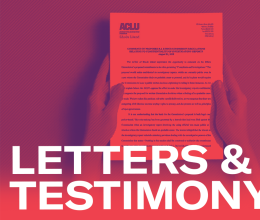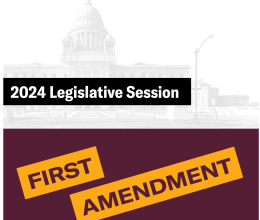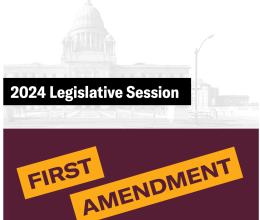The ACLU of R.I. has today filed a “friend of the court” brief in the R.I. Supreme Court in support of the free speech rights of West Warwick resident and Republican Town Committee member Alan Palazzo, who was sued for defamation by state Senator Stephen Alves for his newspaper letter-writing activities. The court brief, filed by ACLU volunteer attorneys Joseph Cavanagh, Jr. and Staci Kolb, argues that the lower court correctly dismissed Alves’ lawsuit as a “SLAPP suit” designed to intimidate Palazzo for exercising his First Amendment rights.
Alves’ lawsuit was based on a series of letters that Palazzo wrote to the Kent County Daily Times in 2001 questioning Alves’ involvement in a costly public school building project. Last year, Superior Court Judge Netti Vogel dismissed the lawsuit and ordered Alves to pay Palazzo’s attorneys fees. Alves appealed that decision.
In 1993, the General Assembly passed a law designed to deter so-called SLAPP suits, which are suits that target citizens for exercising their rights to free speech and petition guaranteed by the First Amendment. Such lawsuits, the ACLU’s brief notes, “are aimed at silencing a plaintiff’s opponents. The purpose of a SLAPP suit is not to win, but to intimidate the SLAPP defendant and to chill petition and/or free speech rights.” The ACLU successfully defended the anti-SLAPP statute in a precedent-setting case in 1996 on behalf of a North Kingstown woman who was sued for defamation for publicly complaining about the environmental hazards of a local landfill. In this case, the ACLU’s brief argues that Judge Vogel correctly applied the statute in dismissing the case, since Palazzo’s letters to the editor addressed an issue of public concern in the community and were “in furtherance of his First Amendment petition and speech rights. Because Alves cannot show a probability on prevailing on any of his claims,” the brief concludes, the trial court was correct to dismiss the suit.
ACLU attorney Kolb said today: “A review of the record reveals that this case is exactly the type that the anti-SLAPP law was designed to protect against. The trial court properly determined that this was a suit designed not to vindicate a clear legal right, but to intimidate the defendant and chill his freedom of speech. We have filed a brief in light of the importance of citizen participation in the local government process and the consequences an adverse court decision would have on members of the public wishing to speak out on important public issues.”




